June 6, 2025 | 06:07 GMT +7
June 6, 2025 | 06:07 GMT +7
Hotline: 0913.378.918
June 6, 2025 | 06:07 GMT +7
Hotline: 0913.378.918
It's been three days since Nguyen Van Binh, 42, a native of Hoai An district, has persistently invited merchants to purchase his twenty pigs, which grow about 80kg per head in weight, but no one has arrived.
While the pigs are unmarketable, pig prices have fallen to an all-time low. Farming live pigs costs VND 35,000 per kg, whereas super-lean pigs raised for biosecurity cost somewhat more, but not more than VND 40,000 per kg. At this stage, the larger the pig herd, the greater the loss.
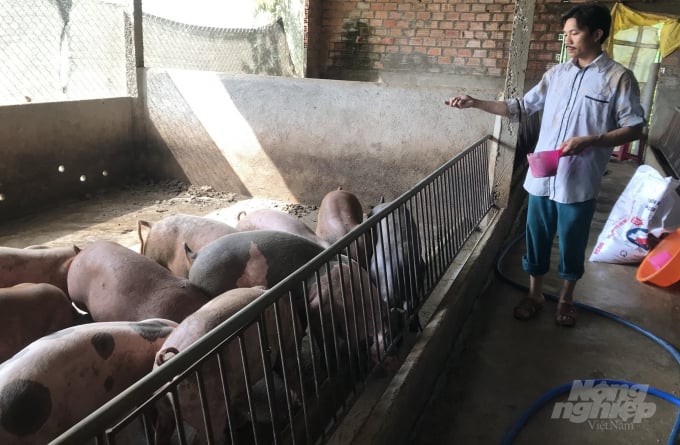
Currently, Mr. Nguyen Van Binh in An Duc commune (Hoai An district, Binh Dinh) wants to sell 20 pigs weighing 80kg per head, but no trader come to buy. Photo: Vu Dinh Thung.
Binh calculated that at the current price of VND 35,000 per kg, a pig reared in a home using a hybrid of hog and super lean pig will reach 80 kg per head, costing the farmer VND 1.6 million per head after it is released from the barn. Farmers would lose up to VND 2 million per head when super-lean pigs bred on biosecurity-oriented farms reach 100 kg per head after being freed from the barn.
"This is not to include the care and veterinary medication required for the pigs during a three- to four-month period. I've been farming pigs for decades, but this is the first time I've experienced such a loss "Mr. Binh assessed the current pig herd's losses.
Ms. Anh Thanh, who owns a 1,000-head pig farm, is also a pork dealer specialized in the Da Nang market. The recent two litters of 1,000 pigs sold out has "blown away" her VND 1.4 billion dong investment owing to loss.
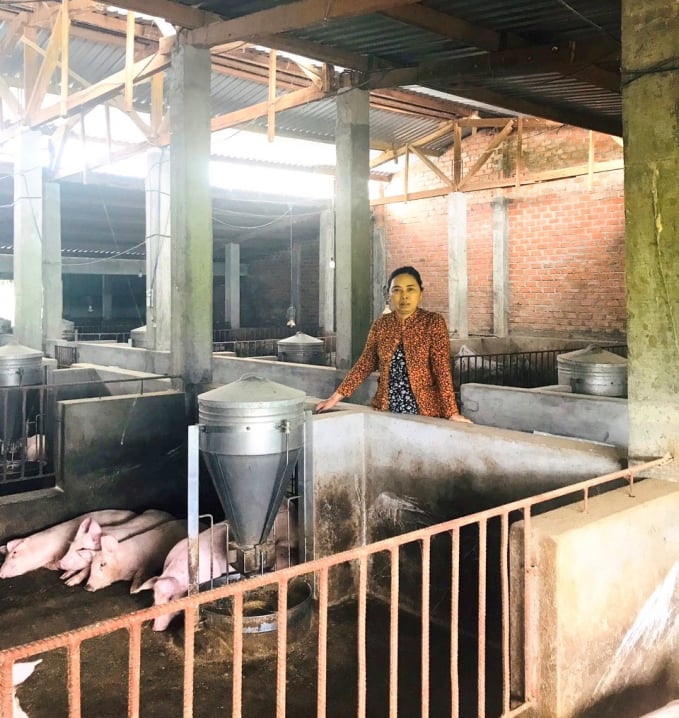
Ms. Tran Thi Le now maintains just 70-80 pigs in the barn and will not contemplate repopulating the big herd until next year. Photo: Vu Dinh Thung.
Hoai An district has four high-tech industrial pig farms with 62 farms earning more than VND 1 billion yearly, 1,926 family farms, and 8,000 small-scale pig households. With pig prices plunging to new lows, everyone is suffering from losses, from large-scale pig farms to tiny pig households. The more the investment, the greater the risk of loss. Pork prices have been reduced, and buying power has also dropped significantly, resulting in a slow pork consuming market.
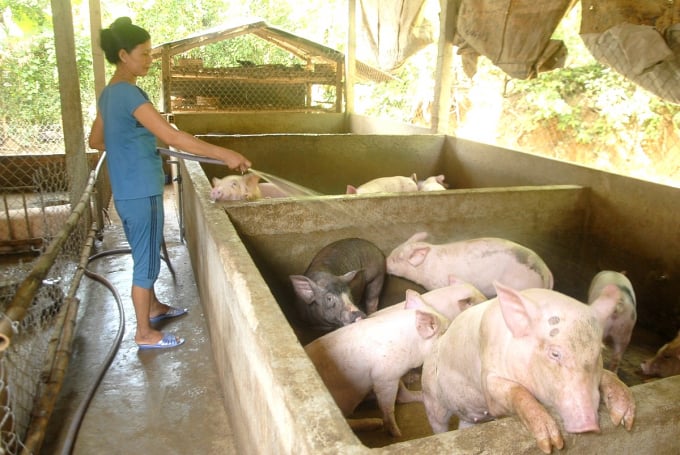
Currently, the price of pigs raised in households in Hoai An (Binh Dinh) is less than VND 35,000 per kg. Photo: Vu Dinh Thung.
According to Ms. Anh Thanh, since communities have reduced social distance and commerce has been restored, the Da Nang market is currently inundated with pigs for consumption from southern provinces.
As a result, despite the fact that Da Nang is the typical market for her pigs, it remains very difficult to sell the pigs she provides.
Many livestock families in Hoai An now have pigs that need to be freed from the barn, but they are unable to sell them. As long as the pigs remain in the barn, the owners face many dangers that day, most notably the threat of African swine disease. Additionally, if piglets arrive at the litter but have not been freed from the barn and are just sitting still, the owner will pay more money, but the pig will be difficult to consume if it is too large.
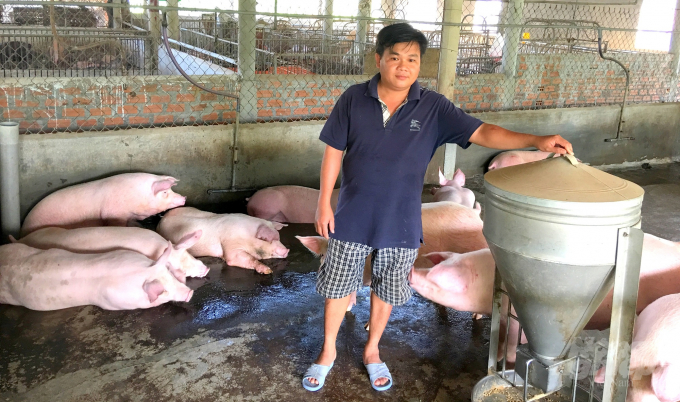
For stocking 80kgper pig head, a pig costs up to VND 4.4 million per head, the selling price is just VND 2.8 million head thus, meaning the farmer has lost VND 1.6 million per head, not even including veterinary medication expenses. Photo: Vu Dinh Thung.
At the moment, pigs reared in homes exceed 100 kg per person; merchants are worried, since pigs of this size have a high fat content, which does not meet customer demand.
The price of pigs fell precipitously just as farmers were re-herding to service the year-end market, forcing farmers to stop production; many families sold empty cages but were afraid to continue breeding for fear of financial loss. Ms. Tran Thi Le of Luong Loc village in Phuoc Hung commune (Tuy Phuoc district) sold 700 pigs two months ago at a price of VND 60,00 per kg but was unable to cover her money.
"At the moment, the quantity of imported pigs is excessive; stores sell imported pigs, which causes domestic pigs to become sluggish. Raising pigs has been difficult lately, and the movement to re-herd to supply the market at the end of the year has stalled in the region. Due to the sluggish pace of re-herding, the area's total pig herd has decreased to fewer than 200,000 heads, while in the past, Hoai An has always maintained a total pig herd of at least 300,000 heads," says Director of the Hoai An District Agricultural Service Center, Nguyen Thanh Vuong.
Translated by Linh Linh

(VAN) Stores have started selling rice from the government’s stockpile to feed demand for the staple.
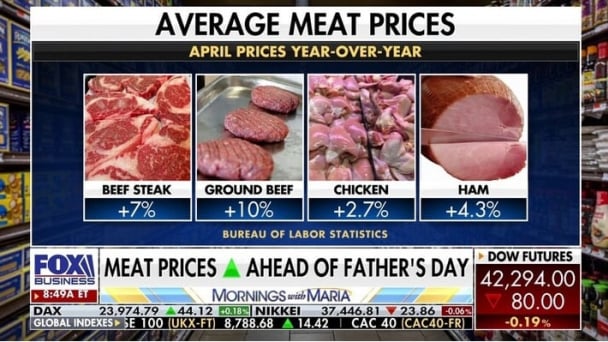
(VAN) Omaha Steaks CEO says rebuilding cattle herds will take about a year to ease price pressures.

(VAN) Reciprocal tariffs and recent NOAA rulings are presenting substantial obstacles for Vietnamese tuna exporters in the U.S. market. As a result, the industry is actively seeking alternative export destinations.

(VAN) Although the U.S. holds a small share of Vietnam’s rubber exports, newly imposed reciprocal tariffs are expected to impact the sector. Vietnamese enterprises must optimize the use of significant markets and free trade agreements.

(VAN) Vietnam's pepper industry is looking forward to the final tariff decision in order to sustain its robust presence in the United States, the country's biggest pepper market.

(VAN) The U.S. is the largest market for Vietnamese cashew nuts. However, when exports to the U.S. encounter difficulties due to reciprocal tariffs, Vietnamese cashews still have many other potential markets.

(VAN) Reciprocal tariffs present a significant obstacle to Vietnam's wood exports to the United States; however, domestic wood businesses are endeavoring to preserve their market share in this critical market.